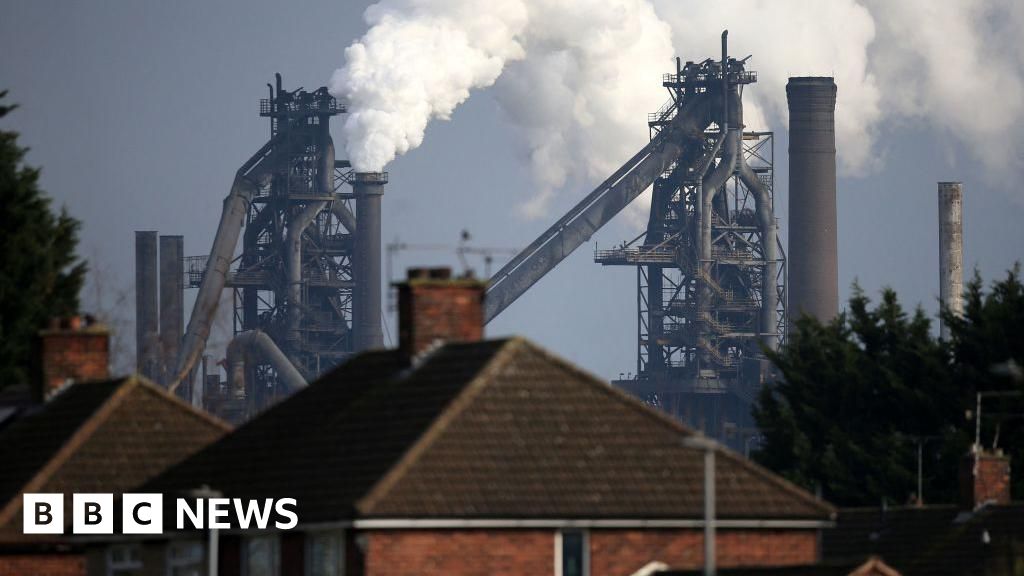Jennifer Meierhans
Business reporter
Sean Seddon & Maia Davies
BBC News
The UK government has assumed control of the British Steel plant located in Scunthorpe, Lincolnshire, due to the threat of its imminent closure. On Saturday, MPs were summoned back to Parliament from their Easter recess to enact an urgent law that enables the government to oversee the Chinese-owned facility and ensure the operation of its two blast furnaces.
Overview of British Steel and Its Workforce
The Scunthorpe plant is home to 2,700 employees, representing approximately 75% of British Steel’s total workforce. It stands as the sole facility in the UK capable of producing virgin steel, which is essential for significant construction projects such as new buildings and railways. The two large blast furnaces at the plant create steel with fewer imperfections compared to the recycled steel produced elsewhere in the nation. If production of virgin steel were to halt, the UK would be left as the only G7 country unable to manufacture it, a scenario the government considers a threat to long-term economic stability.
Ownership and Nationalization Status
British Steel was established in 2016 when Tata Steel sold its unprofitable long products division to the investment firm Greybull Capital for a nominal sum of £1. Subsequently, the company was rebranded as British Steel. Following financial challenges, the government’s insolvency service took over British Steel in 2019, and the following year, it was purchased by the Chinese steel manufacturer Jingye. In late March 2025, Jingye reported that the plant was operating at a loss of approximately £700,000 daily and initiated a consultation regarding closure. Efforts by the government to keep the facility operational led to a quick passage of emergency legislation, transferring control to the government while Jingye retains ownership. Consequently, the business secretary now possesses extensive powers to manage operations and oversee production.
Government Intervention Reasons
The plant’s blast furnaces are running low on essential supplies like coking coal and iron pellets, which raised the urgency of discussions since shutting down a blast furnace and restarting it is both costly and complicated. Unions characterized the situation as critical, with the Community Union labeling the supply shortage as an “extreme emergency.” Even though the government proposed to acquire the necessary raw materials, Jingye did not accept this offer. The business secretary noted that Jingye sought “an excessive amount” of money and indicated that negotiations revealed the company’s intention to stop purchasing sufficient materials for the furnaces, leading towards an irreversible closure of steel production.
Financial Challenges Facing the Scunthorpe Plant
Jingye argued that the blast furnaces are “no longer financially sustainable” due to “highly challenging” market conditions, tariffs, and the costs linked to transitioning to low-carbon production methods. The decline in UK steel production has persisted for decades, and the financial strain on the industry increased in March after the US imposed a 25% tariff on imported steel. Excessive global steel production has resulted in a surplus on the international market, further reducing prices. British manufacturers are also facing higher operational costs, particularly for electricity, compared to their counterparts abroad.
Other UK Steel Producers
Approximately 1,160 businesses operate within the UK steel sector, directly supporting 40,000 additional firms. Tata Steel historically was the largest virgin steel producer in the UK, but it halted its blast furnace operations in September 2024 due to losses amounting to £1.7 million daily. An agreement with the UK government included a £500 million commitment to help transition to more sustainable steel-making practices. Other notable steel producers in the UK comprise Liberty Steel, Celsa, Marcegaglia, and Outokumpu, with Liberty Steel also facing closure of its Scunthorpe plant and resulting in more than 120 job losses due to soaring energy costs. The UK steel industry contributed £2.3 billion to the economy in 2023, equivalent to 0.1% of total economic output and 1.0% of manufacturing output, producing 5.6 million tonnes of crude steel, representing just 0.3% of global production.



